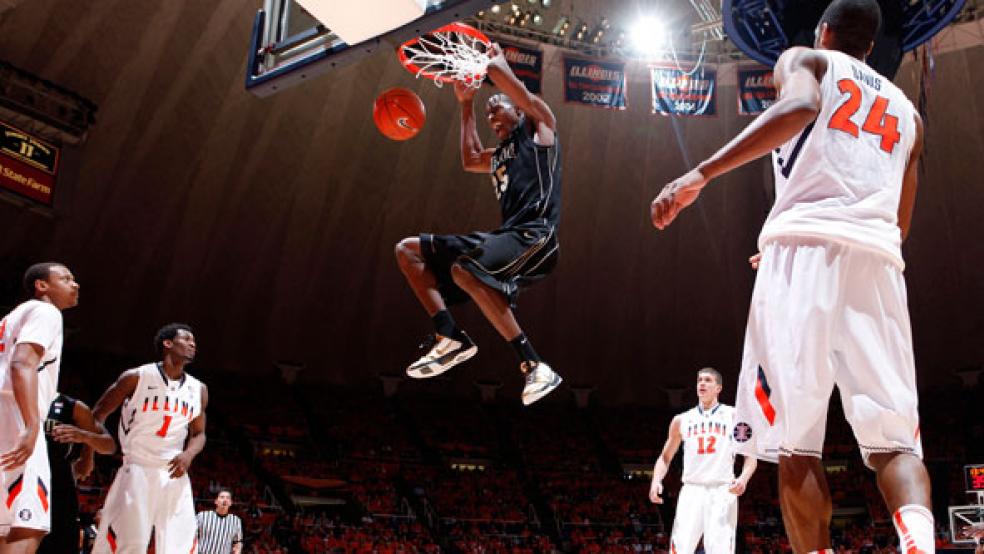March Madness is, of course, about the sweaty, furious, beautiful game of basketball – the best players, most skillful coaches, top performances under pressure. But the NCAA tournament is also the most celebrated tradition in all of college sports and a numbers game like no other athletic event in this country. If that seems like overstatement – consider everything from the tournament's new TV deal to the millions in program-sustaining payouts to the riches that await the tournament's biggest stars in the NBA illuminate, and it’s clear the so-called ‘Big Dance’ really is a big deal.
Ticket sales for March Madness games and the marketing sponsorships that are ubiquitous at arenas and during broadcasts bring in tens of millions for the NCAA. But the real money for the NCAA comes from an innovative television deal. After opting out of the last three seasons of an 11-year, $6 billion deal with CBS after last year's tournament, the NCAA negotiated a new $10.8 billion deal that runs through 2024. It ensures that every NCAA tournament game is broadcast in its entirety on one of four channels – CBS, TNT, TBS and TruTV. Between ticket sales, TV dollars and sponsorships – even peanut butter powerhouse Reese’s is a sponsor – the NCAA generates roughly 96 percent of its annual revenue from March Madness.
4 Fun Facts About March Madness
|
Much of that money goes back to the NCAA conferences and teams represented in the tournament. For each tournament game played, teams earn one money 'unit' for their conferences. The bigger the conference, the greater the payout, which is redistributed throughout the conference. This year, a bigger TV deal has led to more lucrative units.
With the old contract, “the NCAA estimated that each ‘basketball unit’ would be roughly $239,664, for a total $180.5 million distribution,” says Patrick Rishe, economics professor at Webster University and director of SportsImpacts, a consulting firm. “But with the new deal, units will be worth approximately $256,000 each, for a total allocation of between $190 million and $200 million.” Bigger conferences pile up the units, and most (but not all) redistribute the funds equally throughout the conference.
For the Big East Conference, the units add up to some serious dollars: a whopping $98.6 million over the past six seasons. With 11 teams in this year’s field, the Big East stands to generate around $2.5 million more – regardless of results from the first round. And since the conference’s entrants include a number one seed (Pitt), a number two seed (Notre Dame) and a pair of third seeds (Connecticut and Syracuse), the Big East stands to make a good deal more.
Big Payday for Big-Name Coaches
The big money generated by big-time performances in the Big Dance translates to huge paydays for big-name coaches. The University of Kentucky’s John Calipari tops all coaches, with a salary of $4 million a year, and 31 other Division I coaches pull in seven-figure salaries.
Many of those high earners will make a good deal more in bonuses if they win. Arizona coach Sean Miller, for instance, could add up to $675,000 to his $2.3 million base salary if his fifth-seeded Wildcats go all the way.
Given how few NCAA programs turn a profit – in 2009, 117 of 125 men’s programs sampled for the NCAA’s Revenues and Expenses Report announced negative net revenue – these astronomical salaries, in many cases twice the salaries earned by university presidents, may be tough to justify. Of course the market for top coaching talent is highly competitive, which pumps up salaries. But coaching would be far less lucrative if it weren't for a unique NCAA rule.
“The trick, of course, is that the players aren’t allowed to be paid, so the coaches, in essence, get the value produced by their recruits,” according to Smith College economist Andrew Zimbalist. (Big NBA paydays await for March Madness stars, of course: After just one year at Kentucky, John Wall became the top pick of the 2010 NBA draft, and is earning $4.2 million in his first NBA season.) If those coaches and their unpaid charges come up big during March Madness, universities can profit as well.
“Winning records don’t have a direct impact on alumni giving,” said Mark Yost in his book Varsity Green, an examination of college sports economics. “But success in postseason play does.” It’s a notable impact – a boost in donations of around 35 percent, a little over $450,000 per institution.
And Then There’s TV Advertising
A 30-second advertising slot during a first-round NCAA Tournament game on CBS ( yes, the ones that air on a Thursday afternoon) can go for over $100,000. That same spot costs over $1 million during the finals. CBS also has another revenue stream in digital media, and expects to make about $30 million in advertising revenue for its online broadcasts – some 30 percent more than it made back in 2008.
Bettin on the Bucket
This is all, in short, serious money. Still, compare this to the stunning amounts wagered on the NCAA tournament. Estimates range up to $12 billion – far more than is wagered annually on the Super Bowl. R.J. Bell of the sports betting site Pregame.com estimates that some $3 billion of that will be bet in office pools. Those pools are technically illegal in many states, but they’re also a big enough business that Teamrankings.com can charge $99 for its Brackets and Betting Package, which includes picks for every game (according to five different prediction models), strategic tips and more.
That doesn't look like a bad investment, given that Yahoo’s online bracket contest winner will claim $1 million and that betting site Sportsbooks.com is offering a $14 million prize for a perfect bracket. Or at least it doesn’t until you consider that DePaul math professor Jeffrey Bergen estimates that the odds of picking a perfect bracket are worse than predicting which party will win the presidency in every election between now and 2260. As usual, the only sure things during March Madness are that hardcore hoops heads will be in heaven – and that the Big Dance will be an economic bonanza.
View the March Madness slideshow.
Related Links:
Why March Madness Is So Hot This Year (Media Life)
March Madness Quick Hits: Bracket Racket (CSNPhilly.com)
Hooters Offers Doctor’s Note to Cure March Madness (NBC-Bay Area)





